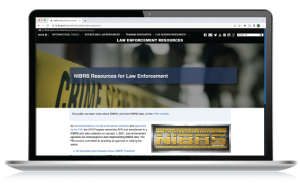
The collection and use of data by law enforcement agencies are among the most valuable and powerful tools law enforcement agencies can employ to “tell the story” of crime and other incidents in their communities. Additionally, effective policing requires evidence-informed and data-driven strategies to identify threats, understand crime trends, determine where to best allocate resources, and drive policy.
The collection of data is not new to law enforcement, but the emphasis on data is becoming increasingly prevalent and imperative. Amid calls by policy makers, an emphasis by the media, and the need from our communities to be as transparent as possible, data collection must be an integral part of every agency’s strategy to analyze, review, and report information that is pertinent to their operation.
There are a number of tools and resources available to agencies in adopting a data-informed approach to policing. The IACP strongly supports the National Use-of-Force Data Collection program to gather data on law enforcement use-of-force incidents, which the FBI launched alongside the IACP and others. While the collection of these data is currently voluntary, discussions around police reform have involved an emphasis on the need to tie the collection of these data to the receipt of federal grants. The IACP has long been an advocate of agencies submitting their data to the National Use-of-Force Data Collection database and being transparent with their communities about how, when, and why their officers, agents, deputies, troopers, and other personnel use force. This data collection effort isn’t just about submitting incidents of force, but also, and possibly more importantly, submitting reports of zero incidents for each month in which there are no use-of-force incidents. In reporting accurate use-of-force statistics, we will obtain data that will allow us to accurately tell our own story and gain control of the narrative, so that the media and others are not controlling the dialogue. If agencies regularly submit to the National Use-of-Force Data Collection program, we will be able to show that the image being painted of the police largely misrepresents the profession by highlighting the millions of successful contacts law enforcement have with the public each day that don’t involve force.
The IACP is also supportive of the National Crime Statistics Exchange (NCS-X), which helps law enforcement agencies report crime statistics to the National Incident-Based Reporting System (NIBRS). NIBRS can provide useful statistics to promote constructive discussion, measured planning, and data-informed policing. Law enforcement agencies can find more information on how to begin the transition process to NIBRS on the FBI’s Law Enforcement Resources webpage.
Properly analyzed and understood data will empower our agencies and officers to carry out our mission.
While important data collection efforts exist on the agency, national, and global scale, the mere collection of data is, by itself, insufficient. The data we are collecting must be analyzed, shared, and used effectively. Only properly analyzed and understood data will empower our agencies and officers to carry out our mission in an efficient, informed, and data-driven manner. Armed with usable data, we, as police executives, can deploy personnel and resources more efficiently; implement predictive policing strategies; better understand our officers’ activities and operational methods; and meet, and hopefully exceed, the expectations of our communities, thereby enhancing public confidence in the police.
Collecting and leveraging data from multiple sources can provide transparency and context to the information provided both to our staff and our community, resulting in increased community awareness and trust. However, even as our profession embraces data-informed policing, we must ensure that the data are collected in a responsible and ethical manner and kept secure. Data should be used only in alignment with the civil rights and civil liberties of the public, and it is imperative that we have policies in place within our agencies that honor these responsibilities. As police leaders, we must continually emphasize the importance of proper data usage to enhance trust, not diminish it. The importance of upholding the integrity of the law enforcement profession cannot be overstated where data are concerned. The thoughtful and purposeful use of data at every level, as well as across jurisdictions, provides great benefits to our profession and community members alike.

As criminal activity evolves, it is critical that policing technology and crime reduction strategies evolve as well. I hope that, as police leaders, you will encourage your agencies to participate in data collection, provide ongoing training to your officers, and work in conjunction with your communities to bring awareness and education on the benefits of data-driven policing. I encourage all agencies to utilize these resources and embrace data-driven policing approaches to better serve our communities.d
Please cite as:
John Letteney, “Using Data to Drive Policing,” President’s Message, Police Chief 90, no. 4 (2023): 6-7.


